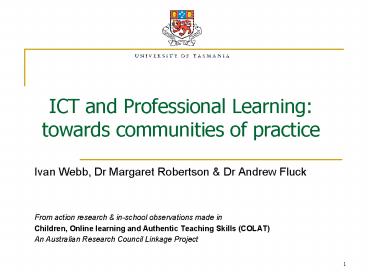ICT and Professional Learning: towards communities of practice PowerPoint PPT Presentation
1 / 24
Title: ICT and Professional Learning: towards communities of practice
1
ICT and Professional Learningtowards
communities of practice
- Ivan Webb, Dr Margaret Robertson Dr Andrew
Fluck - From action research in-school observations
made in - Children, Online learning and Authentic Teaching
Skills (COLAT) - An Australian Research Council Linkage Project
2
Professional Learning ICT- the current context
3
ICT use in schools current situation
- Major systemic initiatives in relation to ICT
- Considerable history of ICT in schools (30
years) - Consistent hope ICT as a catalyst for change
- But.mixed responses within and across schools !
- --------------------------------------------------
--------- - Issue Transfer of ICT use into in-class
practices - What is possible and under what conditions ?
- What is feasible and how ?
- What is desirable and why ?
4
ICT and professional learning
- Becta report ICT and Pedagogy (Cox et al., 2004)
- further substantial support for continuing
professional development is necessary in order
that teachers integrate the use of ICT and
improve pupils attainment (p.5) - however
- little is known about the relationship between
their experiences within professional development
and their subsequent pedagogies when using ICT.
( p.36).
Subsequent?
5
Background COLAT
- Children, Online Learning Authentic Teaching
- ARC Linkage project
- Partners Utas, DoE, CEO, Telstra
- From 2 to 4 days observations
- in each of 27 classrooms
- in 18 schools
6
ICT - three levels of consideration
- ICT is a whole school responsibility!! Consider
ICT in - Governance purposes, leadership management
(policies provision) - Class the use and contribution of ICT
- Activity - using ICT in teaching learning
- --------------------------------------------------
- - Nb. Consideration of ICT use should aim to
achieve alignment and consistency across the
school.
7
Four key success factors (?)
- Purposes rationale for using ICT are shared
- Matching technology is available for use
- Working knowledge - select, operate
troubleshoot ICT - Cost effectiveness - worth time, effort,
investment - --------------------------------------------------
--------------- - Nb Teachers observations confirm the above
order of importance. - Q Where is most professional learning focused?
8
Other COLAT findings
- It is about practices !!
- Reliability is complex - includes window of
opportunity - Professional learning ????
- Collaboration leads to success
- Shared purposes rationales ? meaning (PL)
- Technology is better matched and available
- Knowledge and resources available
- More cost effective
9
COLAT - summary
Practices using ICT
10
Action research projects
- Four in-school projects were undertaken
- In October- November 2003
- To meet local needs
- To check on COLAT findings
- Allowing for local circumstances
- Lead by school team of principal ICT leaders
11
This study six overlapping steps
- Action research (knowledge-based improvement)
- Introductory workshop (proposal COLAT)
- Plan project focus, investigation, initiatives.
- Implement plan (4-6 weeks)
- Monitor and learn from the implementation
- Share learning with other project participants
- Apply knowledge gained (short and long term)
- --------------------------------------------------
----- - Research team collate case studies ? findings
12
Sample Case Study
- Professional learning initiative at School L
13
Sample Case Study School L
14
Sample Case Study School L
Our program
Online journal
15
Sample Case Study School L
Spell checker
Corridor walk
16
Findings
17
Professional Learning Cycle (emergent)
18
The emergent PL process
- Be informed
- Engage the learners as a group
- Focus the learning using IT in situ
- Learn about the ICT application/device
- Plan new/improved practices incorporating ICT
- Apply practices in class programs (asap)
- Observe experiences ? insights
- Share refine knowledge, experiences insights
- Extend embed practices
- Revisit as required
19
Findings - Roles in PL
- Several discerned (not just expert-novice!!)
- Learners all participants
- Co-learners confirm and validate experiences!!
- Tutors ? How to ?'
- Mentors ? What to do?' and Why?
- Facilitators ? opportunities and processes
- Supervisors acknowledge endorse learning and
new or improved practices - --------------------------------------------------
--------------------- - NB. Roles are situational and dynamic!!
20
Recommendations (from participants)
- Keep timelines short and the focus specific
- Link possibilities of ICT with meaningful
products, examples of use, credible experiences - Build collaboration within the learning group
throughout, eg, match tutorslearners ? how to
use manage ICT - Involve learners in planning preparing ICT use
in class - Arrange in-class support ? maximize chance of
success - Learn and apply ? new or improved practices
- Learn, share take it forward (revisit later)
21
Some on-going challenges
- Building collaboration between staff groups
- Accommodating staff changes ? start with
induction - Selecting arranging the most appropriate
technology - When and how to upgrade (development is
disruptive!!) - Inclusion of all staff in PL (equity of
opportunity?) - Performance management vs professional learning,
ie, individual vs collaborative professional
learning
22
Build communities of practice !!
- Focus on new or improved practices
- Be informed ? who knows, or wants to know, what?
- Build PL into the culture through collaboration
- Extend collaboration to teaching, technical
other staff - PL is an on-going process (NOT an event !!)
- Start with situated examples and credible
experiences - --------------------------------------------------
--------------------- - NB. Not a deficit model !!
23
Communities of practice (cont.)
- Keep timelines short and the focus specific
- Share the load several roles dynamic!!
- Take ICT into the classroom with modelling
support. - Learn in meaningful groups and focus on their
practices - Share review the experiences within learning
group - Share experiences results beyond learning group
24
Thanks toProject website
- Project schools and their generous staff members
- COLAT schools and participants
- Numerous colleagues who have provided
encouragement, knowledge insight

